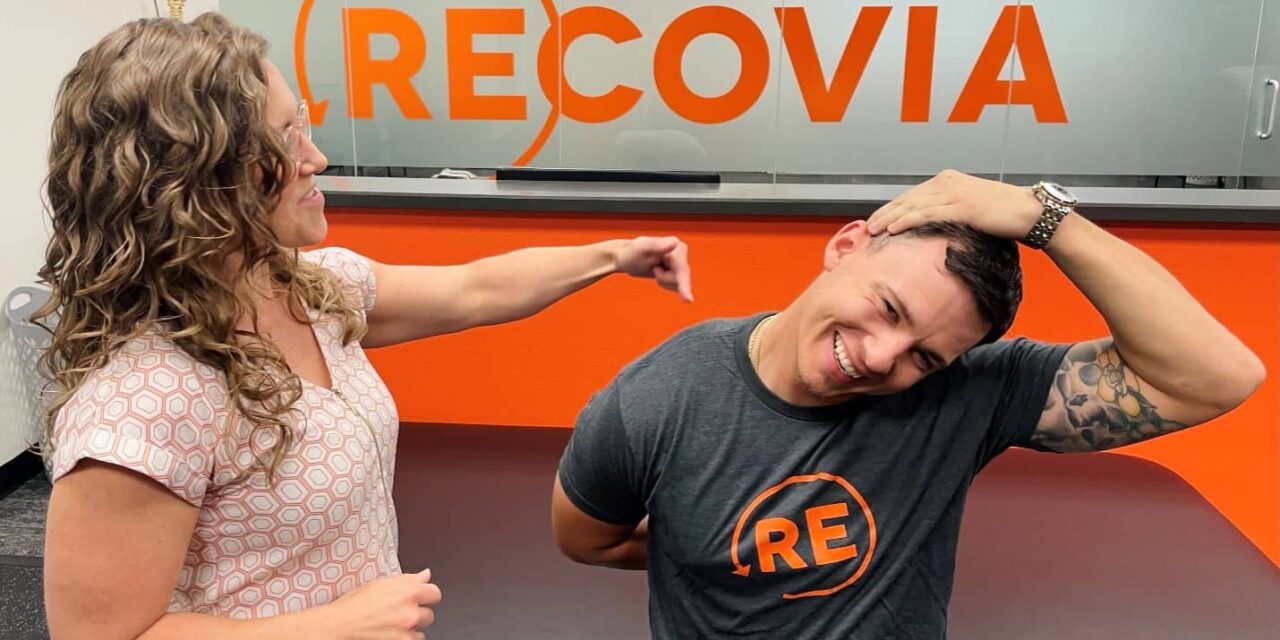Chronic pain treatment benefits from a holistic approach that integrates physical therapy and behavioral health to address both the physical and psychological components of pain.
By Lyndzie Jackson PT, DPT, and Evan Espinosa, PsyD
Discussions about chronic pain treatment often focus primarily on the physical symptoms. For instance, chronic back pain management typically involves physical exercises and medications aimed at alleviating the pain. Traditional physical therapy clinics approach chronic pain through a physical lens, as that is their area of expertise. However, this perspective is narrow. Chronic pain is not solely a physical condition; there is a large mental and emotional component as well.
Often, chronic pain is rooted in physical and mental trauma experienced throughout the lifespan. If not processed appropriately, the body stores this experience and it often manifests as physical pain further down the road. Chronic pain can also be the cause of anxiety and depression due to its impact on quality of life. Pain is processed both physically and mentally, so why do traditional physical therapy clinics address only the physical aspects?
To most effectively treat chronic pain, clinics need to integrate both physical therapy and behavioral health services. Chronic pain treatment should be a holistic process, addressing both the mind and the body. Our perceptions and emotional responses to pain are often psychologically driven, and pain can reshape the way we view the world around us. A comprehensive treatment approach is essential. Treating chronic pain must be intersectional—one that supports healing for both the body and the mind.
Another Tool for Physical Therapists
From a traditional physical therapist’s standpoint, addressing the emotional side of pain isn’t always possible. If a patient is mentally struggling as a byproduct of chronic pain, the most a physical therapist can typically do is suggest they seek counseling. Mental pain isn’t something that can often be treated in outpatient physical therapy settings, nor would most physical therapists have the time to dive into that aspect. However, by investing in a clinic like Recovia, which combines physical therapy with behavioral health, physical therapists are no longer working in isolation. They become part of a collaborative team, with behavioral health specialists on-site to provide integrated care. The physical therapy and behavioral health teams work together from start to finish, ensuring a unified approach to treatment. This team-based model allows for the introduction of new perspectives and strategies when a patient encounters mental roadblocks in their recovery process.
Not all pain conditions can be addressed with physical exercise alone, and considering the psychological aspect can provide a fresh perspective on the mental stressors patients experience. It’s important to recognize the deep connection between the mind and body, and incorporating behavioral health treatment is a valuable addition to any treatment plan. This collaborative approach, where physical therapists work alongside behavioral health specialists, creates a promising pathway for better patient outcomes.
Developing a More Nuanced Understanding of Pain
All pain is real, even when there’s no clear physical cause. Pain doesn’t always show up on X-rays or MRIs, but it’s still felt and processed in the brain. Physical therapists and doctors often rely on visible ailments to guide treatment, but when physical symptoms don’t correlate with imaging results, it doesn’t mean the pain is not real.
Chronic pain patients are sometimes told their pain is psychological and to push through it, which overlooks how mental perceptions of pain impact the body. Telling someone to push through pain can reinforce danger signals in the brain, which tell the body that the activity is harmful, even if tissue damage is not occurring. Over time, this can create negative neuropathways.
To treat chronic pain, it’s important to help patients understand that pain is a protector of actual or potential danger; the brain will then determine the appropriate response. By addressing the mental side of chronic pain, we can slowly increase physical treatment, allowing the brain to reframe its response. Eventually, safety signals replace danger signals, and patients will no longer fear specific movements. An integrated approach helps patients build the skills needed to manage pain effectively.
This approach isn’t just for chronic pain—it can also help with acute pain. Trauma, whether emotional or physical, affects the body’s interpretation of pain, and behavioral health strategies are valuable in managing these responses. Teaching patients how their body processes trauma allows them to better handle pain during treatment and beyond.
Integration is a Worthwhile Challenge
Integrating physical therapy and behavioral health in chronic pain care is challenging and often met with skepticism from both medical professionals and patients. The main barrier is the complexity of creating a cohesive program that requires significant development and training. Everyone involved must have a basic understanding of each other’s expertise, with physical therapists and behavioral health professionals needing to collaborate closely. Establishing an integrated clinic is a long-term commitment, focused not just on medication but on changing how patients perceive pain. This approach is highly effective, and it would be greatly beneficial if the medical community were to step outside its specialty silos to collaborate more effectively.
Pain is both a physical and mental issue. If the brain can’t manage chronic pain, the body won’t be able to either. In our experience, for the most effective treatment, physical therapy clinics should work alongside behavioral health professionals. This integrated approach treats the mind and body together, improving patient outcomes by encouraging collaboration across specialties. Integrated care enhances the overall quality of care and is a valuable asset to any PT clinic.
Lyndzie Jackson PT, DPT is the director of physical therapy at Recovia. Recovia is a non-interventional pain clinic and behavioral health center specializing in chronic pain, mental health, and addiction treatment. Their programs integrate physical therapy, behavioral health, and medical services under one roof to address both the physical and mental aspects of chronic pain.
Evan Espinosa, PsyD, is a licensed clinical psychologist with specialty training in health psychology and cognitive behavioral therapies at Recovia, an outpatient treatment center in Arizona specializing in chronic pain, general mental health, and substance use treatment.





